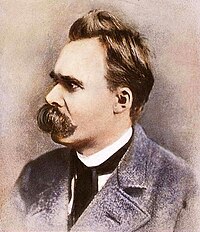Friedrich Nietzsche
Ìrísí
(Àtúnjúwe láti Nietzsche)
| Friedrich Nietzsche | |
|---|---|
 | |
| Orúkọ | Friedrich Nietzsche |
| Ìbí | October 15, 1844 Röcken bei Lützen, Prussia |
| Aláìsí | August 25, 1900 (ọmọ ọdún 55) Weimar, Saxony, German Empire |
| Ìgbà | 19th century philosophy |
| Agbègbè | Western Philosophy |
| Ẹ̀ka-ẹ̀kọ́ | Weimar Classicism; precursor to Continental philosophy, existentialism, Individualism, postmodernism, poststructuralism |
| Ìjẹlógún gangan | aesthetics, ethics, ontology, philosophy of history, psychology, value-theory |
| Àròwá pàtàkì | Apollonian and Dionysian, death of God, eternal recurrence, herd-instinct, master-slave morality, Übermensch, perspectivism, will to power, ressentiment, der letzte Mensch |
Ipa látọ̀dọ̀
| |
| Ìtọwọ́bọ̀wé | |
Friedrich Wilhelm Nietzsche (October 15, 1844 – August 25, 1900) (Pípè nì Jẹ́mánì: [ˈfʁiːdʁɪç ˈvɪlhɛlm ˈniːtsʃə]; in English UK: /ˈniːtʃə/, US: /ˈniːtʃi/[1]) je ara Europe ni orundun 19 to je onimo oye ati onimo filologi ijoun. O ko iwe agbeyewo lori esin, iwuwa, asa igbana, imoye ati sayensi, nipa lilo ede Jemani otooto.

|
Àyọkà yìí tàbí apá rẹ̀ únfẹ́ àtúnṣe sí. Ẹ le fẹ̀ jù báyìí lọ tàbí kí ẹ ṣàtúnṣe rẹ̀ lọ́nà tí yíò mu kúnrẹ́rẹ́. Ẹ ran Wikipedia lọ́wọ́ láti fẹ̀ẹ́ jù báyìí lọ. |
Itokasi
[àtúnṣe | àtúnṣe àmìọ̀rọ̀]- ↑ Wells, John C. (1990). Longman pronunciation dictionary. Harlow, England: Longman. p. 478. ISBN 0582053838. entry "Nietzsche"
